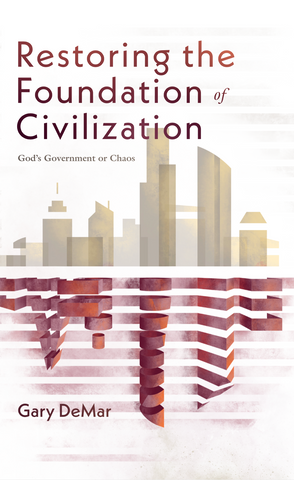Can the gospel and social activism co-exist? Should Christians involve themselves in the world by participating in politics, pursue advanced degrees in education, medicine, science and law, produce films on a wide range of subjects, some even for entertainment value, seek a career in journalism, and develop non-governmental programs for long-term social reform based on a well thought out biblical worldview? Or should Christians spend their lives in so-called full-time Christian service and reject the world? If every Christian followed this ministry track, who would fund both domestic and foreign missions? What would happen to the world if the salt and light of Christians were withdrawn from the world? Not only can’t a biblical case be made for such a narrow Christian mission, but practically speaking, it would be impossible, impractical, and frightening.
Our Only Agenda?
Christian author and pastor John MacArthur writes: “We are interested in people becoming saved. That is our only agenda…. It is the only thing that we are in the world to do.”[1] The only thing? What about the thousands of people who attend his church and work in hundreds of different professions that have no direct relationship to the single agenda of “people becoming saved”? Has he told his members to quit their jobs and head for the highways and byways to get people saved 24/7? Of course not. Is it possible to have a better society with the gospel? Absolutely. You can’t have one without the other.
Right after he tells us that preaching the gospel “is our only agenda,” MacArthur adds this caveat: “If we are going to see our nation transformed, it has to be done from the inside out, that’s our agenda.” Agreed. But how? The late Francis Schaeffer asked it this way: “How should we then live?”[2] Charles Colson updated the question with “How now shall we live?”[3] with more specific answers for today’s issues.

Restoring the Foundation of Civilization
There are many Christians who will not participate in civilization-building efforts that include economics, journalism, politics, education, and science because they believe (or have been taught to believe) these areas of thought are outside the realm of what constitutes a Christian worldview. Nothing could be further from the truth.
Buy NowIn a book edited by John MacArthur and produced by The Master’s College faculty and published by Crossway we learn that Christians should recover a Christian worldview. There are even chapters on church and state, economics, and art.[4] The chapter on developing a biblical view of Church and State makes the good point that “Believers need to be reminded that there can be no healthy or lasting change of social structures without a redemptive change in people, which is why Christ came two thousand years ago.”[5] So we’ve moved from preaching the gospel “is our only agenda” to teaching a broader agenda that includes changing social structures. Don’t expect any success since MacArthur said the following:
We don’t win down here, we lose. You ready for that? Oh, you were a post-millennialist, you thought we were just going to go waltzing into the kingdom if you took over the world? No, we lose here — get it. It killed Jesus. It killed all the apostles. We’re all going to be persecuted. … We don’t win. We lose on this battlefield, but we win on the big one, the eternal one.
Fortunately, like Francis Schaeffer before him, who was also a premillennialist, MacArthur is not consistent. He took on the political establishment in California over COVID restrictions. It’s a shame that all churches didn’t follow him.
America is a mess, and we can also include the world. Is this the first time? No. There were two world wars in the 20th century. Have we forgotten the French Revolution? The rise of Communism? And yet, we’re still here. What about the health of the church? There was this insignificant event when a monk decided to question the authority and corruption of the Holy Roman Empire. There is fear that if Christians get involved in politics, the gospel message will be diluted. That might happen, but it doesn’t have to. It doesn’t seem to register with some that our non-involvement has not enhanced the gospel any. It is not inevitable that Christians, once successful in the political realm, will get “blinded by might.”[6] Because even as Christians we remain sinners. There are always pitfalls and dangers in any endeavor, even those distant from so-called worldly pursuits. Almost all the admonitions found in the New Testament are leveled against Christians in a church environment (e.g., 1 Cor. 5:1-2; 6:1-11). Paul knows the temptation that some might have to “lord it over the faith” (2 Cor. 1:24). Corrupt leaders (1 Sam. 2:12-25) and “savage wolves” (Acts 20:29) are not exclusive to the realm of politics. The Church is no more immune to “power politics” than the State. The church is no less bureaucratic than the numerous alphabet soup agencies that rule over our lives, from the FDA and FAA to the DEA and SSA.
Not to be involved at some level in worldview issues by those who understand the things of Christ creates a political moral and power vacuum that will undoubtedly be filled by people who despise the gospel and cross of Christ. Of course, the goal of Christians is not to dominate civil government, to use the power of the State to impose a top-down political regime on the masses. In fact, one reason to be involved in civil government at this point in history is to decrease its expanding power.[7] Instead of seeking political power, Christians should work for its dilution. To do this, Christians must be involved in the process to serve as a brake on the excesses of church and political power.

Liberty at Risk
Without a proper understanding of civil government's biblical function and limited jurisdiction, Christians can be trapped into believing that civil government should promote policies beyond its designed purpose as long as they are for "the good of the people." This reasoning can lead many to choose security no matter what the cost to liberty.
Buy NowNo one I know is claiming that government can save anyone**[8]** or that politics is a substitute for the cross of Christ.[9] Civil governments are not in the gospel business, but they are in the justice business. That’s their God-ordained ministry. (The Bible describes the civil magistrate as a “minister” or “servant” [διάκονός/diakonos] of God”: Rom. 13:4.) To want a better government does not mean that the State becomes messianic or an ecclesiastical substitute.
A Finger in the Dike
The assumption of so many opposed to almost any kind of social activism by Christians is the belief that once the gospel is preached, we will have a better world. At one level this is true. As Michael Novak, observes, “When there are 250 million consciences on guard, it is surprising how few police are needed on the streets.”[10] But right now we do not have 250 million consciences, and until we do, certain precautions need to be taken because of everyone’s sinful nature. Our founding fathers understood this. John Adams wrote:
The moral government of God, and his viceregent, Conscience, ought to be sufficient to restrain men to obedience, to justice, and benevolence at all times and in all places; we must therefore descend from the dignity of our nature when we think of civil government at all. But the nature of mankind is one thing, and the reason of mankind another; and the first has the same relation to the last as the whole to a part. The passions and appetites are parts of human nature as well as reason and the moral sense. In the institution of government it must be remembered that, although reason ought always to govern individuals, it certainly never did since the Fall, and never will till the Millennium; and human nature must be taken as it is, as it has been, and will be.[11]
Knowing the predisposition of sinful man, should we distance ourselves from those institutions that have an immediate impact on our lives? If civil governors have no regard for God, what makes us think they will have regard for those made in His image? In 1986, the NBC television network presented a drama about the gripping and courageous story of Raoul Wallenberg and his attempts to save European Jews from their Nazi tormentor, Colonel Adolf Eichmann. Wallenberg’s efforts may have made the difference between life and death for nearly 120,000 Hungarian Jews.
During the story, the viewer is struck by an emotional scene of Jews being loaded into trucks for shipment to a concentration camp. A Jewish teenager turns to a rabbi and confronts him with a seemingly unanswerable question: “How can you still believe in God after all of this?” The rabbi does not take long to respond: “How can you still believe in man?”
Presently, Christians are playing defense, protecting those necessary freedoms that remain. Our defensive strategy is like that of Peter of Haarlem, the lockkeeper’s son, who stuck his finger in a dike when he saw that his town was threatened by a flood. Peter could have gone about preaching the gospel, but at that moment, the town needed to be saved from an impending deluge. If the flood had come, there wouldn’t have been anyone around to preach the gospel.
Sons of Issachar Needed
Do Christians automatically know what to do because they are Christians? Does regeneration turn a person into an expert in theology or economics? Not at all. The transformation of the heart is the first step in the process, while the necessary next step is the renewing of the mind (Rom. 12:2). Why do we need a new mind? “To prove what the will of God is.” But if salvation is our only goal, why do Christians have to know God’s more comprehensive will? If salvation is all there is, that’s all God wants us to know. Mature Christians, through “practice,” are to “have their senses trained to discern good and evil” (Heb. 5:14). Discernment takes time and training. But for what end? The model is the sons of Issachar, “men who understood the times with knowledge of what Israel should do” (1 Chron. 12:32).
[1]Quoted in Jon Zens and Cliff Bjork, “A Better Society Without the Gospel? The Unbiblical Expectations of Many Christian Leaders,” Searching Together 27:1, 2, 3 (Spring-Fall 1999), 12.
[2]Francis A. Schaeffer, How Should We Then Live? in The Complete Works of Francis A. Schaeffer: A Christian Worldview, 5 vols. (Westchester, IL: Crossway Books, 1982), 5:79-277.
[3]Charles Colson and Nancy Pearcy, How Now Shall We Live? (Wheaton, IL: Tyndale House, 1999).
[4]John MacArthur, gen. ed., Think Biblically!: Recovering a Christian Worldview (Wheaton, IL: Crossway, 2003).
[5]John P. Stead, “Developing a Biblical View of Church and State,” Think Biblically!, 293-294.
[6]Cal Thomas and Ed Dobson, Blinded by Might: Can the Religious Right Save America? (Grand Rapids, MI: Zondervan, 1999).
[7]Gary DeMar, Liberty at Risk: Exposing the Politics of Plunder (Powder Springs, GA: American Vision, 2003).
[8]John MacArthur, Why Government Can’t Save You: Alternative to Political Activism (Nashville, TN: Word Publishing, 2000).
[9]Edwin W. Lutzer, Why the Cross Can Do What Politics Can’t (Eugene, OR: Harvest House, 1999).
[10]Michael Novak, “The Causes of Virtue” (a speech given in Washington, DC, January 31, 1994). Quoted in Charles Colson, Justice that Restores: Why Our Justice System Doesn’t Work and the Only Method of True Reform (Wheaton, IL: Tyndale Publishers, 2001), 105. Also see Colson, “Why Not Commit a Crime?,” Christianity Today (January 9, 1995).
[11]John Adams. Quoted by Michael Novak, On Two Wings: Humble Faith and Common Sense at the American Founding (San Francisco, CA: Encounter Books, 2002), 49.

